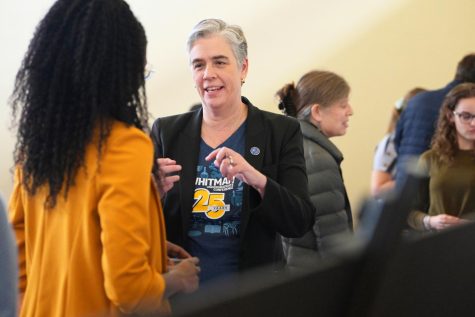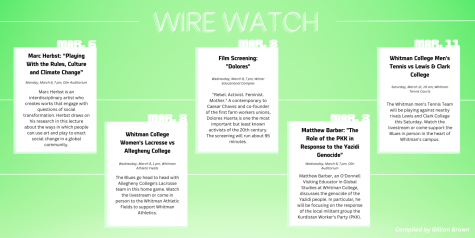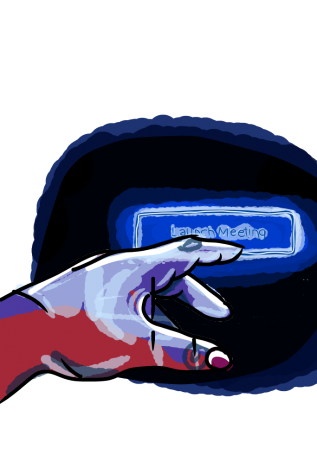Whitman Undergraduate Conference prepares for 20th edition
April 4, 2018
On Tues., April 10, Whitman will hold the annual Undergraduate Conference (WUC), showcasing student research and scholarship from all three divisions. The 2018 edition is especially significant, as it marks the 20th anniversary of the first WUC. In that time, over 3000 students have participated.
Tom Callister, former Associate Dean of the Faculty, sparked the convention two decades ago through the office of the Provost. When Callister retired in 2011, the Office of Fellowships and Grants assumed responsibility for the conference.
This year’s event will be curated by Chair of the Whitman Undergraduate Conference Organizing Committee Keith Raether. In an email to The Wire, Raether stressed continuity during those 20 years.
”The conference hasn’t changed in any fundamental way. No one has seen a need or reason to reinvent the wheel. We’ve introduced some new sessions, such as a presentation platform for original work by student composers. We’ve also encouraged student-organized group forums. Participation has expanded, especially in Division III. This year we’ll see a record 51 science posters in the conference,” Raether said.
Activities begin at 8:15 a.m. with breakfast at Reid and don’t wrap up until 5:00 p.m. with the conclusion of the fourth session. This year’s schedule boasts a wide variety of topics: from presentations about research in the hard sciences to analysis of Austrian poetry. Some students present final papers or assignments for specific classes, while others may describe their theses.
Raether describes the Conference as “the distillation of a liberal arts education” as students showcase values paramount to the mission of Whitman College. Raether continued, “Inquiry, critical thinking, interpretation and reflection are on full display. For me, the exhilaration is the same every year: students are the instructors; faculty and staff are the recipients of their wisdom and perspective.”
For many students, the stakes are high due to the enormous personal investment in their scholarship.
One such student is senior Liz Chenok, who will be presenting research that has culminated in her Sociology thesis. Chenok is studying summer camp as an example of a “total institution” akin to a prison or a mental institution. Though this may at first seem strange, Chenok sees important overlaps.
“I was looking to see what characteristics summer camps have that are similar to trends in total institutions, and how people formed their identities around those experiences,” Chenok said.
Like many other projects, Chenok’s is based in her own experience. She has spent many long summer days working at the camp that she studied. This blend of the personal and the academic is central to the mission of the Undergraduate Conference.
“I have lived through this experience multiple times, which has I think provided me with a really interesting perspective. A lot of the interviews that I did were with people that I already had relationships with,” Chenok continued. “Part of the reason that I chose to study my own camp was because of my personal experience there. Before coming to Whitman, [being involved with camp] was one of the biggest parts of my identity … it has been really interesting to apply a sort of detached and academic lens to something in my life that means a lot to me personally.”
Tied to the emphasis on efficacious scholarship with deep ties to the non-academic world is the Conference’s focus on interdisciplinary study. On this, Raether highlights “the cross-pollination between disciplines or areas of inquiry is one of the salient elements of the conference. In assembling panels, there are always a few strays that need a home in the four- or five-unit panel format. The fun really begins there, trying to find the subtle, essential links across disciplines that mean everything.”
Junior Olivia Gilbert ‘19 is a German Studies and Politics Major presenting on mathematical infinity. The project began by translating the work of the twentieth-century mathematician David Hilbert from German into English, and has progressed from there.
Though Gilbert doesn’t have the training in upper-level math to understand the more technical side of Hilbert’s work, her background in the Social Sciences and Humanities provides an interesting set of tools for analysis.
“I was a little nervous at first because of the heavy focus on mathematics. Even thought I don’t know the math on a technical level, the idea of infinity is very alluring and so I agreed. Long story short, it ended up being really interesting, and even though I don’t necessarily know all of the math on a technical level, I am familiar with the ideas and I can discuss them,” Gilbert said.
The project progressed from translation into contextualization, with Gilbert and her advisor pushing ever further into the philosophical questions that Hilbert’s work generated.
“What is the ontological existence of mathematics? Is it a language that allows us to tap into this higher realm that we are only beginning to uncover, or is it more of a system of signs that act as rules of a game, devoid of meaning in themselves but that can be filled in?” Gilbert continued, “Most working mathematicians aren’t necessarily engaging with this kind of question, in practice these sorts of questions don’t come up, which is why it is so important to attack these sorts of questions from different angles.”








